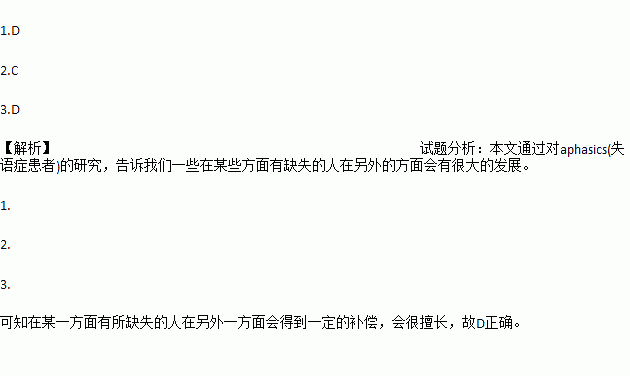题目内容
People who have lost the ability to understan d or use words due to brain damage are called aphasics(失语症患者).Such patients can be extremely good at something else.From the changing expressions on speakers' faces and the tones of their voices,they can tell lies from truths.
d or use words due to brain damage are called aphasics(失语症患者).Such patients can be extremely good at something else.From the changing expressions on speakers' faces and the tones of their voices,they can tell lies from truths.
Doctors studying the human brain have given a number of examples of this amazing power of aphasics.Some have even compared this power to that of a dog with an ability to find out the drugs hidden in the baggage.
Recently,scientists carried out tests to see if all that was said about aphasics was true.They studied a mixed group of people.Some were normal;others were aphasics.It was proved that the aphasics were far ahead of the normal people in recognizing false speeches—in most cases,the normal people were fooled by words,but the aphasics were not.
Some years ago,Dr.Oliver Sacks wrote in his book about his experiences with aphasics.He mentioned a particular case in a hospital.Some aphasics were watching the president giving a speech on TV.Since the president had been an actor earlier,making a good speech was no problem for him.He was trying to put his feelings into every word of his speech.
But his way of speaking had the opposite effect on the patients.They didn't seem to believe him.Instead,they burst into laughter.The aphasics knew that the president did not mean a word of what he was saying.He was lying!
Many doctors see aphasics as people who are not completely normal because they lack the ability to understand words.However,according to Dr.Sacks,they are more gifted than normal people.Normal people may get carried away by words.Aphasics seem to understand human expressions better,though they cannot understand words.
1.What is so surprising about aphasics?
A. They can fool other people.
B. They can tell whether people are lying.
C. They can understand language better.
D. They can find out the hidden drugs.
2.How did the scientists study aphasics?
A. By asking them to watch TV together.
B. By organizing them into acting groups.
C. By comparing them with normal people.
D. By giving them chances to speak on TV.
3.What do we learn from this text?
A. What ones says reflects how one feels.
B. Aphasics have richer feelings than others.
C. Normal people often tell lies in their speeches.
D. People poor at one thing can be good at another.


 but don’t blame yourself for making it, especially in public.
but don’t blame yourself for making it, especially in public.